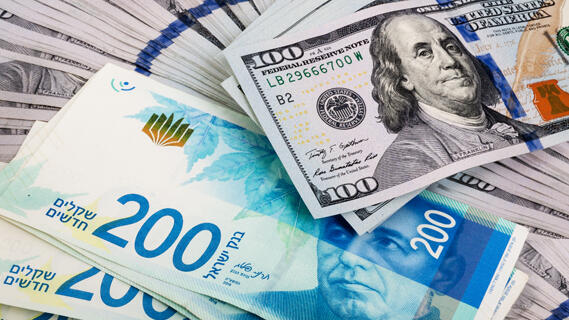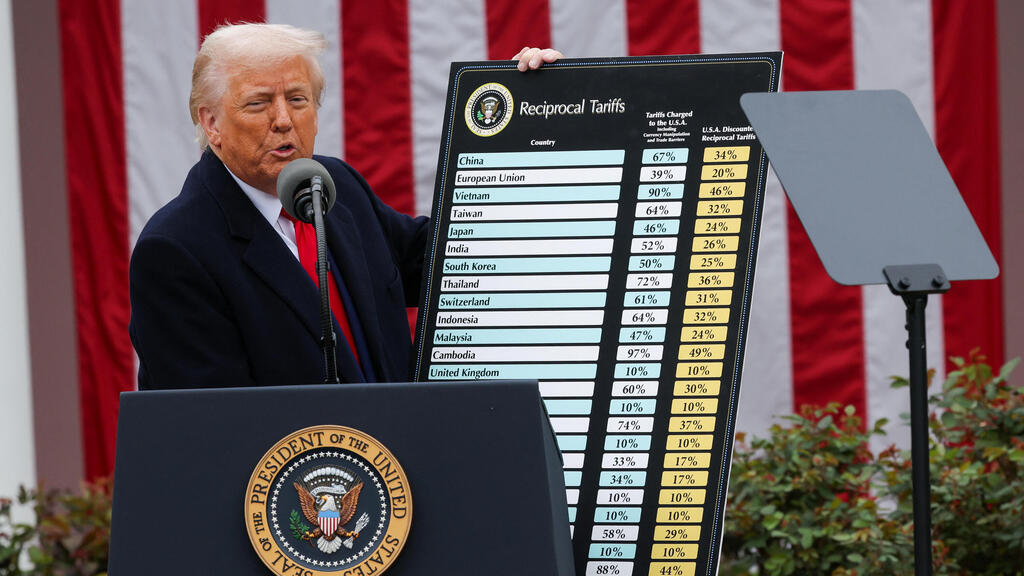Israeli government ministries and business leaders warned Thursday of significant economic implications following U.S. President Donald Trump’s decision to impose a 17% tariff on Israeli goods exported to the U.S.
The Finance Ministry said Minister Bezalel Smotrich would convene senior staff for an emergency meeting to assess the consequences and plan the next steps.
According to the Foreign Trade Administration, Israeli exports to the U.S. totaled $37.2 billion in 2024 — $14.3 billion in goods and $22.9 billion in services. The main exported goods were semiconductors and electronic equipment (27%), as well as medical devices and pharmaceuticals (24%). Service exports, which make up the majority, will not be subject to the new tariff for now.
The Israel Export Institute said it's currently evaluating the potential impact and exploring whether certain key sectors — such as pharmaceuticals and semiconductors — could be exempt.
While the tariffs present a serious challenge to unprotected industries, the exclusion of critical sectors and the continued free trade in services could help maintain a stable economic relationship between the countries, the institute said.
“Israel will need to focus its diplomatic and economic efforts on minimizing the damage and identifying new market opportunities,” the statement added.
Ron Tomer, president of the Manufacturers Association of Israel, criticized the tariff move as confusing and potentially harmful, noting that Trump’s claim Israel imposed a 33% tariff on U.S. goods is inaccurate. “If that’s the basis for the 17% U.S. tariff, it’s not clear or justified,” he said.
<< Get the Ynetnews app on your smartphone: Google Play: https://bit.ly/4eJ37pE | Apple App Store: https://bit.ly/3ZL7iNv >>
Tomer warned the decision could hurt Israel’s economic stability, discourage foreign investment and weaken Israeli firms’ competitiveness in the U.S. market. “If it stands, this would mark a setback in decades of strong trade and investment ties between the countries. We hope it’s temporary and will work with the government to reverse it.”
In 2024, U.S. exports to Israel totaled $15.8 billion — $9.1 billion in goods and $6.7 billion in services. A senior industrialist with extensive U.S. operations told Ynet’s sister outlet Calcalist that while the tariff news was serious, Israel isn’t in the worst position compared to other affected countries.
“We still don’t fully understand the decision — there’s a lot we don’t know yet, and maybe even Trump doesn’t know,” he said, referring to Trump’s recent flip-flopping on his Gaza policy. “We’ll also need to watch how other countries react. Their response could trigger a snowball effect. Right now, the only certainty is that we all need to stay alert.”
Karin Mayer Rubinstein, CEO of the Israel Advanced Technology Industries (IATI), noted that the 17% tariff is lower than those imposed on some other countries, potentially giving Israeli companies a competitive edge over non-U.S. rivals.
However, she warned that because Israeli high-tech firms mainly compete with American companies, the overall impact may be complex and depend on how the policy is implemented.
“If the tariffs apply only to physical goods like electronic components, machinery or food, the effect on high-tech could be limited,” she said. “But if they extend to software products —especially Software as a Service (SaaS), which is central to Israeli tech — it could fundamentally alter market access and deter investors and customers.”
Rubinstein also stressed the importance of clarifying whether chip exports would be affected, given their strategic role in Israel’s global tech footprint.




